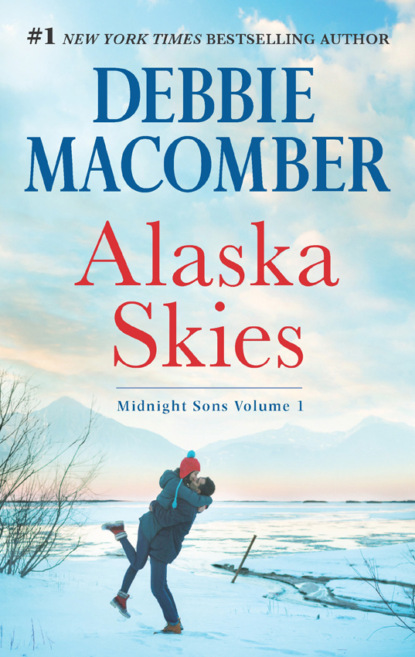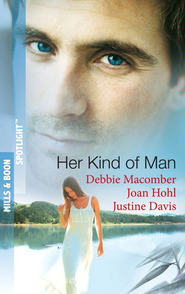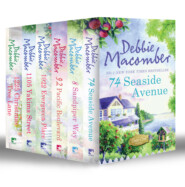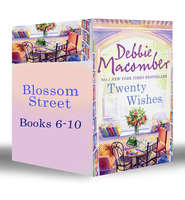По всем вопросам обращайтесь на: info@litportal.ru
(©) 2003-2024.
✖
Alaska Skies: Brides for Brothers / The Marriage Risk
Автор
Год написания книги
2018
Настройки чтения
Размер шрифта
Высота строк
Поля
“When can I meet your dog?” Scott asked eagerly.
“Soon,” Sawyer promised. Eagle Catcher didn’t take easily to strangers; the husky wouldn’t allow the boy to come near him until after two or three visits. Sawyer decided he’d bring Scott over to the house that evening and show him Eagle Catcher’s pen. But the kid would be long gone before the husky accepted him as a friend.
“I’d like to see the library, too, if it wouldn’t be too much trouble,” Abbey said.
“Of course,” Sawyer said in a friendly voice, but a shiver of guilt passed through him. When he’d last spoken to his mother, he’d told her they’d hired a librarian. Ellen had been excited to learn that her gift to the town was finally going to be put to use.
Sawyer squeezed the four of them into the cab of his pickup and drove down the main road. There were a couple of short side streets, but none that anyone had bothered to name.
“What’s that?” Susan asked, pointing to a small wooden structure that stood outside the mercantile. She giggled. “It looks like a little house on stilts.”
“It’s called a cache. We use it to store food and keep it safe from bears and other marauding animals.”
“Alaska’s got lots of bears,” Scott murmured as if he was well versed in the subject. “I read about them in the books Mom brought home from the library.”
“How come the cache has legs that look like they’re wearing silver stockings?” The question came from Susan again.
“That’s tin,” Sawyer explained, “and it’s slippery. Discourages those who like to climb.”
“I wouldn’t try and climb it,” Scott said.
“I don’t think he’s referring to boys,” Abbey told her son. “He was talking about the animals.”
“Oh.”
“Is it still in use?” Abbey asked.
“Yes, it is. I don’t know what Pete keeps in there during the summer months, but it’s a crude kind of freezer in winter.”
“I see.”
“Oh, this is Main Street,” Sawyer said as they continued down the dirt road. Dust scattered in every direction, creating a dense cloud in their wake.
“I wondered if there’d be any leftover snow,” Abbey said. She seemed to be trying to make polite conversation.
“It hasn’t been gone all that long.” Sawyer knew he should use the opportunity to tell her how harsh the winters were and how bleak life was during December, January and February, but he was afraid Abbey would see straight through him. He preferred to be a bit more subtle in his attempt to convince her to go home.
“Is that the school?” Scott asked, pointing to the left.
“Yup.”
“It sure is small.”
“Yup. We’ve got two teachers. One for grades one through eight and another for high school. We had more than twenty students last year.”
“Ben told me you’ve got a new elementary teacher coming soon,” Abbey said.
“That’s right.” The state provided living quarters for the teacher. The house was one of the best in town, with all the modern conveniences. It was a palace compared to the cabin that would be Abbey’s.
They drove past the lodge with its ugly black scars. Susan pressed her face to the window, and Sawyer waited for another barrage of questions, but none was forthcoming.
“Is the cabin close by?” Abbey asked. They’d already passed the outskirts of Hard Luck.
“Not much farther.”
She glanced over her shoulder, as if gauging the distance between the town and her new home.
Sawyer parked in front of the cluster of small cabins and pointed to the one that had been readied for her. Seeing it now, battered by time and the elements, Sawyer experienced a definite feeling of guilt. The idea of luring women north with the promise of housing and land had been a bad idea from the first.
“These are the cabins your brother mentioned?” Abbey kept her voice low, but her shock was all too evident.
“Yes.” This was the moment Sawyer had dreaded.
“We’re supposed to live here?” Scott asked in the same incredulous tone.
“I’m afraid so.”
Susan opened the truck door and climbed out. The seven-year-old planted her hands on her hips and exhaled loudly. “It’s a dump.”
Sawyer said nothing. Frankly, he agreed with the kid.
“It looks like one of those places where you freeze meat in the winter, only it isn’t on stilts,” Scott muttered.
Without a word Abbey walked into the cabin. Sawyer didn’t follow; he knew what she was going to see. A single bed, a crude table and solitary chair, along with a woodstove. A small store of food supplies, stacked in a primitive cupboard.
“Mom,” Scott wailed, “we can’t live here!”
“It is a bit smaller than we expected,” Abbey said. Her shoulders seemed to droop with the weight of her disappointment.
Hands still on her hips, Susan stood there, feet wide apart, as she surveyed the cabin. She shook her head. “This place is a dump,” she repeated.
“Where’s the bathroom?” Scott asked, giving the one-room interior a second look.
“There’s an outhouse in the back,” Sawyer told him. “Just take the path.”
“What’s an outhouse?” Susan asked her mother.
Abbey closed her eyes briefly. “Follow Scott and you’ll find out for yourself.”
The two disappeared, and Abbey turned to Sawyer. He thought she’d yell at him, call him and his brother jerks for misleading her. Instead, she asked, “What about the twenty acres?”
“It’s, uh, several miles to the east of here,” he explained reluctantly. “I have the plot map in the office and I’ll show you later if you want.”
“You mean to say the cabin doesn’t sit on the twenty acres?”
“No,” he answered, swallowing hard. When they’d initially discussed the details of this arrangement, it had all seemed equitable. Sort of. After all, Midnight Sons was picking up the women’s airfare and related expenses. But at the defeated, angry look in Abbey’s eyes, Sawyer felt like a jerk. Worse than a jerk. He wished she’d just yell at him.
“I see,” she said after a long silence. Her voice was so low Sawyer had to strain to hear.











